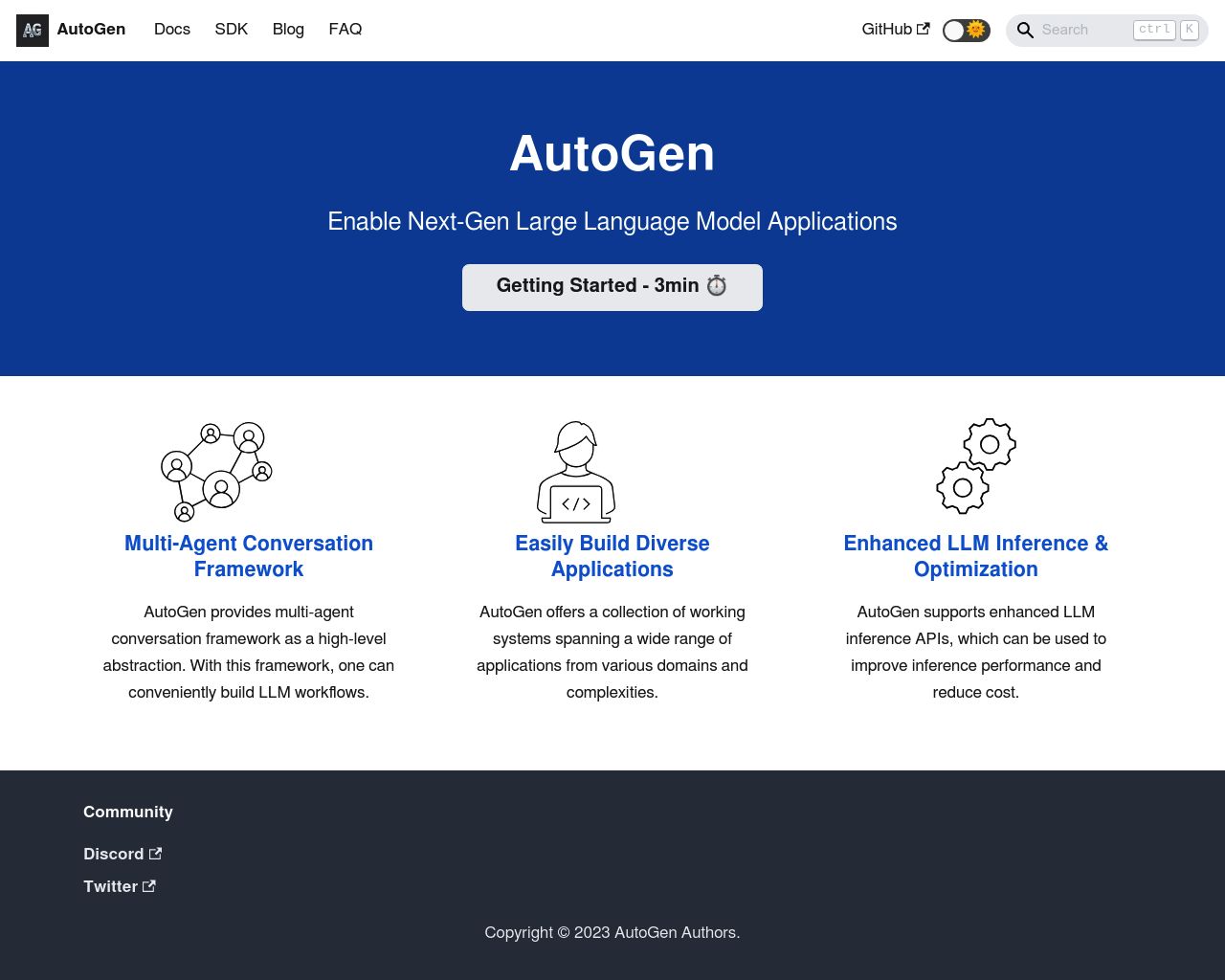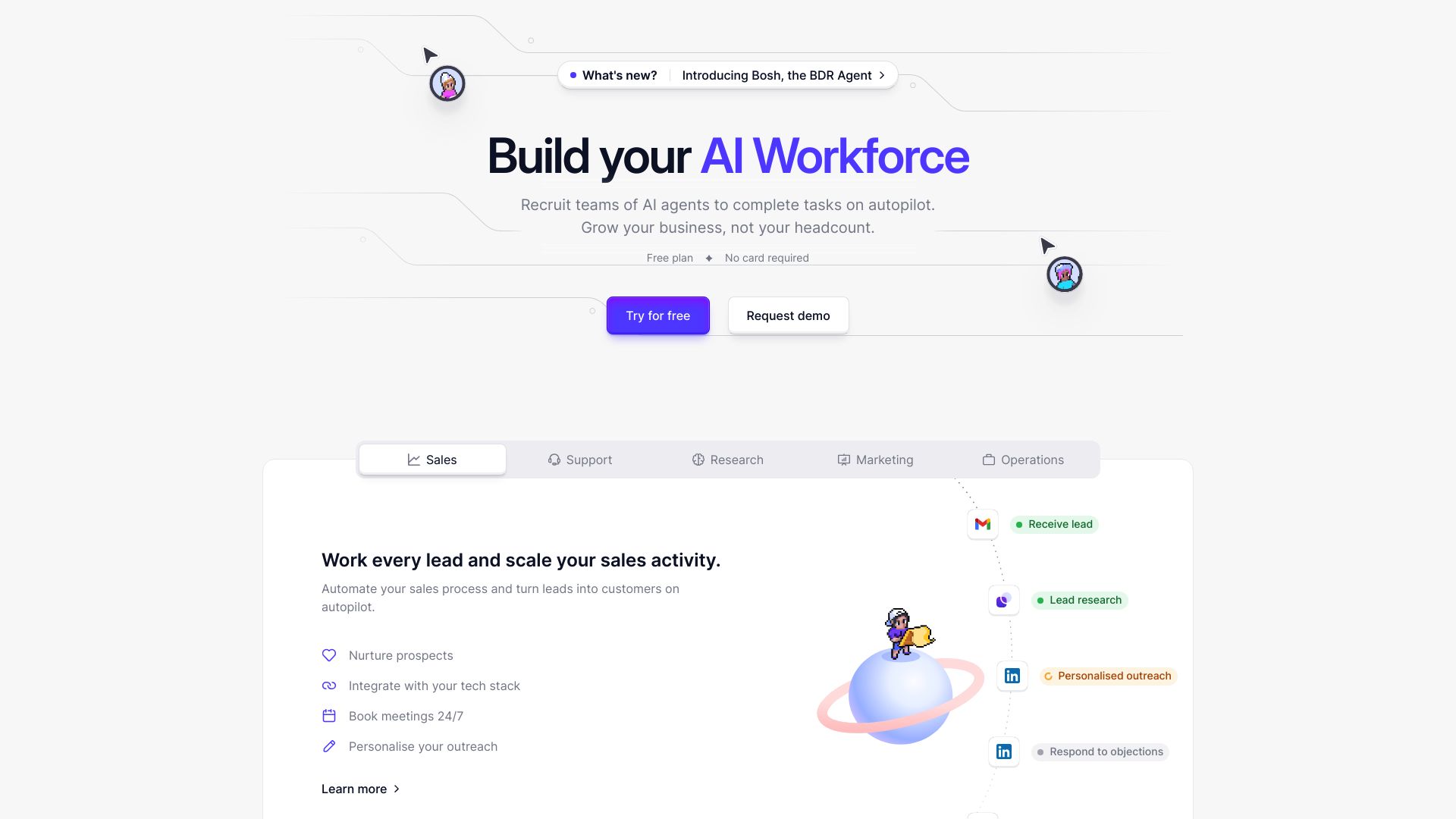AutoGen vs. Relevance AI: Comparing AI Agent Builders
AI-powered agent builders are transforming how businesses create intelligent automation solutions. AutoGen vs. Relevance AI, and SmythOS each offer unique approaches to developing AI agents, catering to different user needs and technical expertise levels. This comparison explores the key features, strengths, and limitations of these platforms, helping you choose the right tool for your AI development projects.
Whether you’re a seasoned developer seeking advanced multi-agent capabilities, a business leader looking for low-code solutions, or an enterprise team prioritizing security and scalability, understanding the nuances of these platforms is crucial for making an informed decision in today’s AI-driven landscape.
AutoGen Overview
AutoGen empowers developers to build sophisticated AI applications using multi-agent conversations. This open-source framework orchestrates customizable agents that interact with each other, Large Language Models (LLMs), tools, and humans to tackle complex tasks.


AutoGen’s core strength lies in its multi-agent architecture. Developers can create teams of AI agents that collaborate autonomously or with human input, adapting to various use cases. The framework optimizes LLM performance through advanced inference features like tuning, caching, and error handling, maximizing the utility of powerful models such as GPT-4.
AutoGen empowers developers to build sophisticated AI applications using multi-agent conversations. This open-source framework orchestrates customizable agents that interact with each other… to tackle complex tasks.
The platform supports both fully autonomous operations and human-in-the-loop workflows, offering flexibility for applications where human expertise is crucial. AutoGen proves effective across diverse domains, from automated task solving and code generation to continual learning and complex problem-solving in group chat scenarios.
Developers benefit from AutoGen’s debugging tools and logging capabilities for API calls, essential for diagnosing and refining LLM-based systems. The framework also includes EcoOptiGen, a cost-effective technique for tuning large language models, highlighting its focus on efficiency.
While AutoGen offers powerful capabilities, it requires coding knowledge to set up agents and workflows. The lack of a visual builder or no-code editor may present a steeper learning curve for non-technical users. Additionally, the framework’s documentation doesn’t explicitly mention features like data encryption or IP control, which could be important considerations for enterprise deployments.
Relevance AI Overview
Relevance AI empowers users to build and deploy AI agents and tools with minimal coding. The platform’s low-code environment allows rapid development of custom AI solutions, typically within minutes.


Relevance AI’s standout features include multi-provider support, enabling users to switch between various Large Language Model providers seamlessly. This flexibility ensures adaptability to changing AI technologies. The platform also boasts a built-in vector store, enhancing data handling capabilities for text storage and retrieval.
Relevance AI empowers users to build and deploy AI agents and tools with minimal coding. The platform’s low-code environment allows rapid development of custom AI solutions, typically within minutes.
The ’Magic Deployment’ feature offers a fully managed service for deploying Large Language Model features, eliminating infrastructure and scaling concerns. This allows users to focus on creating AI solutions rather than managing technical complexities. Relevance AI also provides a type-safe and flexible SDK, ensuring robust application building with Large Language Model features.
While Relevance AI excels in many areas, it lacks some advanced features like a visual builder or no-code editor, which might limit accessibility for non-technical users. The platform also doesn’t offer specific features like agent work scheduling or data encryption, which could be crucial for certain enterprise applications.
Despite these limitations, Relevance AI’s strength lies in its ability to democratize AI technology, making it accessible to a wider range of users and industries. Its focus on low-code development and flexible deployment options positions it as a valuable tool for businesses looking to integrate AI capabilities into their workflows efficiently.
Feature Comparison
AutoGen and Relevance AI offer distinct approaches to AI agent development, with key differences in their core components and security features. AutoGen excels in multi-agent collaboration, providing a framework for autonomous agents to interact and solve complex tasks. Its debugging tools and logging capabilities give developers deep insights into agent behavior. However, AutoGen lacks a visual builder or no-code editor, potentially limiting accessibility for non-technical users.
Relevance AI, on the other hand, focuses on low-code development, allowing rapid creation of AI solutions. Its multi-provider support enables seamless switching between Large Language Model providers, offering flexibility in AI technology choices. Relevance AI’s built-in vector store enhances data handling for text storage and retrieval. However, it doesn’t provide specific features like agent work scheduling or data encryption, which could be crucial for certain enterprise applications.
Both platforms have gaps in security features. AutoGen doesn’t explicitly mention data encryption or IP control, while Relevance AI lacks information on constrained alignment for ethical AI practices. These omissions could be significant for organizations with strict security and compliance requirements.
Feature Comparison Table
| AutoGen | Relevance AI | SmythOS | |
|---|---|---|---|
| CORE FEATURES | |||
| Visual Builder | ❌ | ✅ | ✅ |
| No-Code Options | ❌ | ✅ | ✅ |
| Explainability & Transparency | ✅ | ❌ | ✅ |
| Multi-Agent Collaboration | ✅ | ❌ | ✅ |
| Audit Logs for Analytics | ✅ | ❌ | ✅ |
| Work as Team | ✅ | ❌ | ✅ |
| Agent Work Scheduler | ❌ | ✅ | ✅ |
| SECURITY | |||
| Constrained Alignment | ❌ | ❌ | ✅ |
| IP Control | ❌ | ❌ | ✅ |
| COMPONENTS | |||
| Huggingface AIs | ✅ | ❌ | ✅ |
| Zapier APIs | ✅ | ❌ | ✅ |
| Data Lakes | ❌ | ❌ | ✅ |
| DEPLOYMENT OPTIONS (EMBODIMENTS) | |||
| Staging Domains | ❌ | ✅ | ✅ |
| Production Domains | ❌ | ✅ | ✅ |
| Deploy as Scheduled Agent | ❌ | ✅ | ✅ |
| DATA LAKE SUPPORT | |||
| Hosted Vector Database | ❌ | ✅ | ✅ |
| Sitemap Crawler | ❌ | ❌ | ✅ |
| YouTube Transcript Crawler | ❌ | ✅ | ✅ |
| URL Crawler | ✅ | ❌ | ✅ |
Best Alternative to AutoGen and Relevance AI
SmythOS emerges as a superior alternative to AutoGen and Relevance AI, offering a comprehensive platform for AI agent development and deployment. Our solution combines the best of both worlds: the powerful multi-agent capabilities of AutoGen and the user-friendly approach of Relevance AI, while addressing their limitations and adding unique features.
We designed SmythOS with ease of use in mind, featuring an intuitive drag-and-drop interface that allows users to create complex AI workflows without extensive coding knowledge. This visual builder democratizes AI development, making it accessible to both technical and non-technical users alike. Unlike AutoGen, which lacks a visual interface, SmythOS empowers users to rapidly prototype and deploy AI solutions.
We designed SmythOS with ease of use in mind, featuring an intuitive drag-and-drop interface that allows users to create complex AI workflows without extensive coding knowledge.
Our platform boasts an unparalleled feature set that surpasses both AutoGen and Relevance AI. We offer robust multi-agent collaboration capabilities, allowing AI agents to work together seamlessly on complex tasks. This functionality, missing in Relevance AI, enables the creation of sophisticated AI systems that can tackle intricate problems. Additionally, SmythOS provides advanced explainability and transparency features, ensuring users can understand and trust the decisions made by their AI agents.
SmythOS stands out with its comprehensive security features, addressing the gaps present in both AutoGen and Relevance AI. We implement constrained alignment to ensure AI behavior aligns with organizational goals and ethical guidelines. Our platform also offers data encryption and IP control, providing a secure environment for AI development and deployment. These critical security measures, often overlooked by competitors, make SmythOS the ideal choice for enterprises with strict compliance requirements.
With SmythOS, the possibilities for AI agent deployment are virtually unlimited. Our platform supports a wide range of deployment options, including APIs, webhooks, site chats, and scheduled agents. We also offer seamless integration with popular AI models and tools, such as Hugging Face and Zapier, expanding the potential applications of your AI agents. This versatility, combined with our scalable infrastructure, positions SmythOS as the go-to solution for businesses looking to harness the full potential of AI across their operations.
Conclusion
Automating workflows and integrating AI capabilities have become essential for businesses seeking to stay competitive. AutoGen’s multi-agent architecture and Relevance AI’s low-code environment offer powerful tools for AI development, but SmythOS emerges as the superior choice for organizations looking to harness AI’s full potential.
SmythOS combines the strengths of its competitors while addressing their limitations. Like AutoGen, it supports multi-agent collaboration and advanced debugging. Similar to Relevance AI, it offers a user-friendly interface for rapid development. However, SmythOS goes further by providing a visual builder and no-code editor, making AI accessible to both technical and non-technical users.
Unlike its competitors, SmythOS offers comprehensive security features, including data encryption and IP control. Its extensive integration ecosystem, with over 300,000 pre-built connections, surpasses both AutoGen and Relevance AI in versatility. SmythOS also excels in deployment options, allowing users to create agents once and deploy them across various platforms effortlessly.
For businesses ready to revolutionize their workflows with AI, SmythOS stands out as the clear choice. We invite you to explore our diverse range of AI-powered agent templates and experience unlimited AI automation risk-free. Discover how SmythOS can transform your business processes and unlock new levels of productivity today.
Last updated:
Disclaimer: The information presented in this article is for general informational purposes only and is provided as is. While we strive to keep the content up-to-date and accurate, we make no representations or warranties of any kind, express or implied, about the completeness, accuracy, reliability, suitability, or availability of the information contained in this article.
Any reliance you place on such information is strictly at your own risk. We reserve the right to make additions, deletions, or modifications to the contents of this article at any time without prior notice.
In no event will we be liable for any loss or damage including without limitation, indirect or consequential loss or damage, or any loss or damage whatsoever arising from loss of data, profits, or any other loss not specified herein arising out of, or in connection with, the use of this article.
Despite our best efforts, this article may contain oversights, errors, or omissions. If you notice any inaccuracies or have concerns about the content, please report them through our content feedback form. Your input helps us maintain the quality and reliability of our information.
